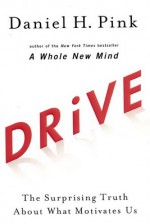
Most of us believe that the best way to motivate ourselves and others is with external rewards like money—the carrot-and-stick approach. That’s a mistake, Daniel H. Pink says in, Drive: The Surprising Truth About What Motivates Us, his provocative and persuasive new book. The central theme in Drive is the mismatch between what science has discovered and what businesses do when it comes to motivating people. The secret to high performance and satisfaction—at work, at school, and at home—is the deeply human need to direct our own lives, to learn and create new things, and to do better by ourselves and our world.
Drawing on four decades of scientific research on human motivation, Pink exposes the mismatch between what science knows and what business does—and how that affects every aspect of life. He demonstrates that while carrots and sticks worked successfully in the twentieth century, that’s precisely the wrong way to motivate people for today’s challenges. In Drive, he examines the three elements of true motivation — autonomy, mastery, and purpose—and offers smart and surprising techniques for putting these into action. Along the way, he takes us to companies that are enlisting new approaches to motivation and introduces us to the scientists and entrepreneurs who are pointing a bold way forward.
Pink presents conclusive evidence of what we already know deep down – that what makes us want to get out of bed every morning has nothing to do with “increasing shareholder value.” It is knowing that the people who matter to us value our contribution. It is the satisfaction that comes from getting something done that required us to stretch ourselves to our limits.
 The carrot-and-stick pattern of motivation, what Pink calls motivation 2.0, is giving way to the recognition that people have a stronger drive for purpose and meaning than they do for rewards, what Pink calls motivation 3.0. Bonuses and other rewards work well for short-term gains but can become an obstruction to long-term satisfaction. If your team does something for the money or the prize, you forfeit the real reason people want to work at something – as a display of autonomy, mastery and purpose.
The carrot-and-stick pattern of motivation, what Pink calls motivation 2.0, is giving way to the recognition that people have a stronger drive for purpose and meaning than they do for rewards, what Pink calls motivation 3.0. Bonuses and other rewards work well for short-term gains but can become an obstruction to long-term satisfaction. If your team does something for the money or the prize, you forfeit the real reason people want to work at something – as a display of autonomy, mastery and purpose.
According to Pink, people would prefer activities where they can pursue three things:
* Autonomy: People want to have control over their work.
* Mastery: People want to get better at what they do.
* Purpose: People want to be part of something that is bigger than they are.
